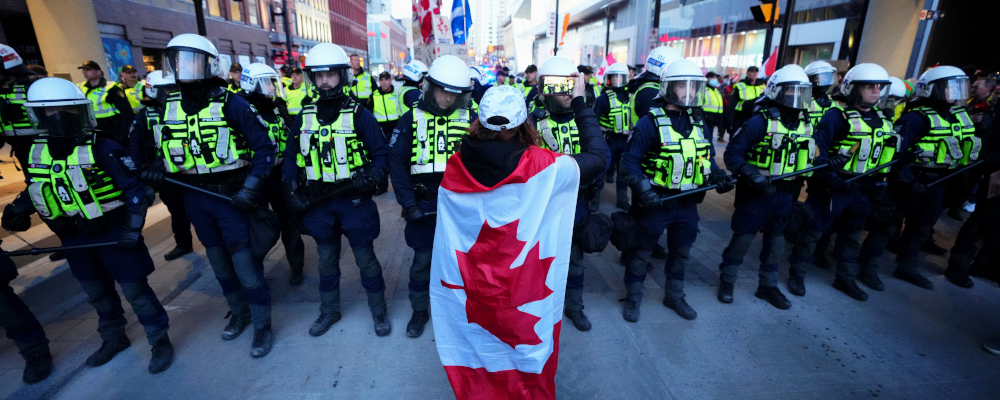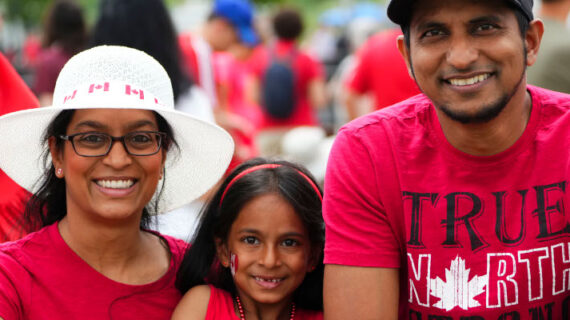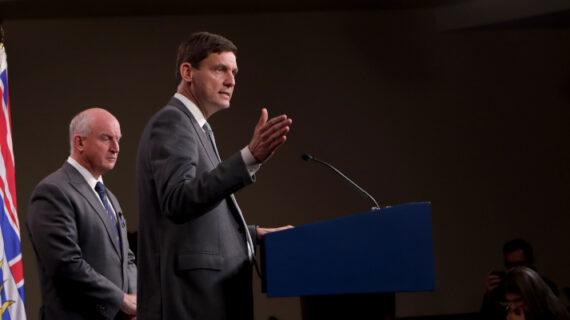As 2024 begins to take shape, one reoccurring question I hear on the street and on my podcast is: What happened to Canada?
The question was posed to me after school libraries in Peel, a municipality west of Toronto, purged thousands of books published before 2008 in the name of “equity.” And it happened, many times, when the government froze the bank accounts of truckers protesting pandemic measures.
With each new development and each new conversation, I’ve been forced to wonder: What has happened to my country? How did we go from being a proudly pluralistic liberal democracy to a polarized nation that memory holes The Diary of a Young Girl by Anne Frank and de-banks those who reject the party line?
I never used to get asked about what happened to Canada.
We’ve long been viewed as a model country. But recently, the social fabric has frayed dramatically, and in a remarkably short period of time, with the culture wars apparent in Europe and the United States playing out here in extreme ways.
The next question on many people’s minds is: How did we get here?
A housing crisis
To understand Canada’s cultural and political decline, one must begin by looking at economics. It is significant that over the past decade or so, ordinary Canadians have been priced out of affordable housing. In Vancouver, where I grew up, home ownership is out of reach for all but the top earners, with one report showing that the minimum annual income needed to buy a house is $246,100. Rents have skyrocketed too, decoupled from local incomes. In Toronto, where I live, the median individual income is $39,200 a year, while the average rent for a one-bedroom apartment is $2,594 per month.
This math clearly does not add up, and it generates a level of ambient desperation that’s as unhealthy for individuals as it is for society—particularly when combined with inflation, high food costs, and the rise of gig and contract labour, with more than a third of Canadians now precariously employed.

One in four Canadians report that meeting basic financial needs has been difficult, or very difficult, in the past year.
This struggle to make ends meet also contributes to our epidemic of social isolation, with many working long hours, leaving little time for friends, community, public service, arts and culture, or faith.
For obvious reasons, these conditions also impact Canadians’ ability to start a family, delaying the life cycle, and, at scale, contributing to a birth rate that’s been steadily declining since 2009, with our country now well below population replacement at 1.4 children per woman. (Statistics Canada has warned we are in danger of becoming a “lowest-low” fertility country, with a rapidly aging population that places stress on the labour market, health care, and pensions.) Behind such a statistic stand legions of lonely souls who were told growing up that if they worked hard and respected the law they could afford a decent life and a family if they wanted one.
It would be difficult to overstate just how much rage Millennial and Gen Z Canadians feel about the collapse of this social contract—and just how much resentment exists towards older generations, who failed to preserve it.
A powerful ideology
Enter identitarian moralism, often referred to as “woke” politics.
During the same decade or so that housing affordability was tanking in Canada, an ideology arrived that took a radical posture on social issues while maintaining the economic status quo.
This new line of thinking originated at elite American universities and spread to Canada through social media. It presents itself as leftist but eschews key leftist concepts such as class analysis, universalism, and the importance of free speech. Instead, it views politics through the lens of identity, focusing on equalizing outcomes between identity groups, as well as on problematizing language, criticizing social, cultural, and interpersonal norms, and building up a vast administrative class to advance such efforts.
Critically, it presents its ideas as moral imperatives, trading persuasion for campaigns of public shaming.
It is a political project that’s been widely embraced by economic elites in Canada, from individuals to corporate and governmental leaders, including Justin Trudeau. Though clearly well-intentioned in some instances, in practice it serves to assuage the guilt of the haves and to signal their virtue to the have-nots. (See the prevalence of Indigenous land acknowledgments at public events in Canada. This exercise makes participants look and feel good but does nothing to improve the living conditions of Indigenous people.)
Identitarian moralism, as it happens, has also appealed to a vocal and understandably pessimistic segment of the have-nots—chiefly a class of young, educated knowledge workers, whose economic prospects have markedly declined. As other writers have pointed out in the past, this ethos provides a low-effort outlet for feelings of powerlessness. The causes of Canada’s decline are multifold, complex, and difficult to address. Calling someone a bigot online is relatively easy.
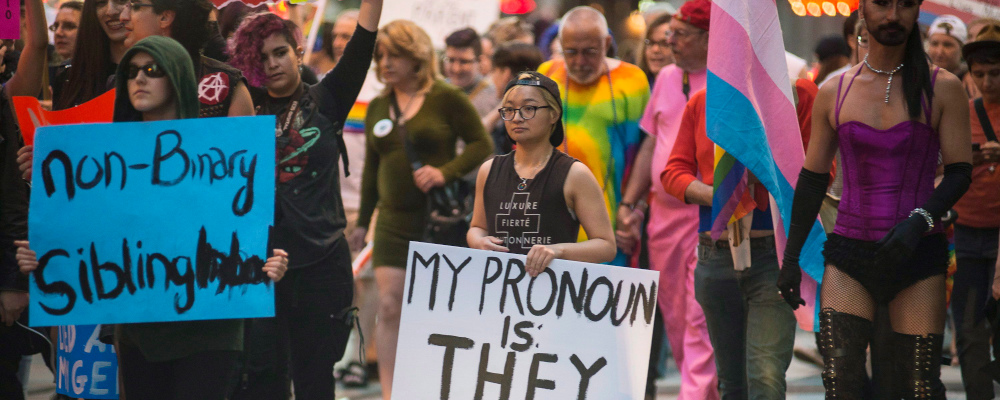
A failing media and intellectual class
A robust media might have played a critical role in analyzing these developments, airing out debates on solutions, and giving voice to those shut out of the Canadian Dream.
But during this same period, as in many other countries, our media has been in freefall, with the advertising business model collapsing. In response, our government has implemented high-profile, aggressive interventions into the industry, awarding millions in press subsidies that have both failed to stem the tide of outlet closures and have likely undermined public trust in the media. Add to that, Bill C-18 has resulted in Meta platforms like Facebook and Instagram dropping Canadian news, hampering the ability of digital start-ups to find an audience and further imperiling an already fragile media ecosystem.
Our press corps faces mass layoffs and precarious employment—and is increasingly made up of those from financially privileged backgrounds, or else the aforementioned disillusioned knowledge workers. Both groups have largely adopted the identitarian ideology and its jargon (regardless of whether their outlet leans Left or Right), further alienating an already distrustful public.
A creeping censoriousness, driven by social media mobs and amplified uncritically by our media, has only intensified this dynamic.
Against this backdrop of widespread fear over lost reputations and livelihoods, it’s hardly surprising that Canada’s intellectual class has failed to push back. Who could wonder that the literary community, for instance—made up of writers whose average annual income hovers somewhere around $10,000—has remained largely silent, with few speaking up to defend freedom of expression.
All of this is why the pandemic proved so utterly explosive. Canada’s answer to this once-in-a-century crisis was public policy that exacerbated these underlying tensions. Long lockdowns and school closures polarized society even further, protecting, and even enriching, the well-off and those able to work from home, while driving the rest to desperation.
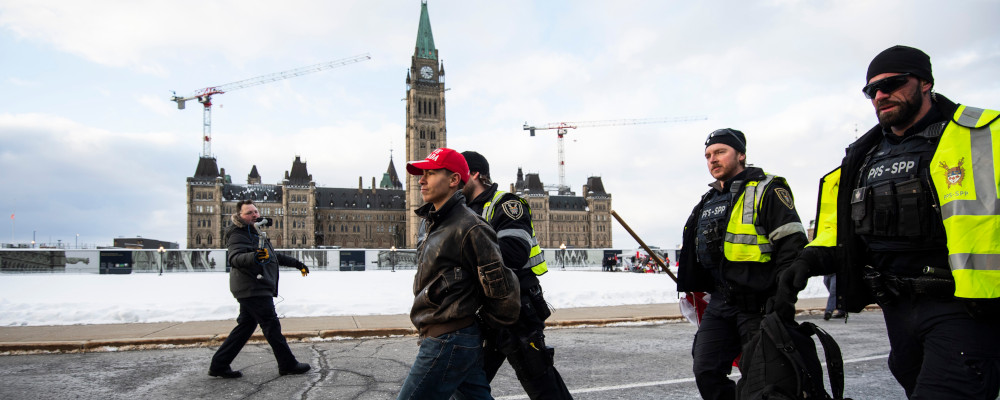
A national crisis sparks a polarization spiral
It was into this combustible moment that Justin Trudeau—already perceived by many as privileged and out of touch with working Canadians—stepped in to trigger an election in the fall of 2021, making vaccine mandates a wedge issue, pathologizing a number of unvaccinated Canadians as racists and misogynists, and, when truckers took over the capital, deploying the Emergencies Act, originally intended for wartime, against them.
It was a political calculation that had devastating social consequences, ripping communities and even families apart.
During this charged moment—as Lean Out predicted in early 2022—Canadian society transitioned from a tense society to a high-conflict one.
Investigative journalist Amanda Ripley, author of High Conflict: Why We Get Trapped and How We Get Out, defines the phenomenon as “an us-versus-them conflict that seems to have a life of its own. Where the facts stop mattering very much and it becomes all about the fear of the other side.” In high-conflict societies, the discourse gets simplified, and “the complexity of real life and real problems gets crystallized and gets spliced in half…There’s good versus evil.”
We are now seeing such polarization play out throughout Canadian society, most recently around the Israel/Hamas war.
In high conflict, the polarization spirals as each side reacts to the loudest and most outrageous actors on the opposing side, and ratchets up rhetoric accordingly. Thus, the culture comes to be defined by the most extreme voices on the margins, while the Exhausted Majority checks out.
Interrupting this spiral is extremely difficult, as the conflict is magnetic. And each fresh outrage serves to amplify this magnetism.
But understanding the dynamics of polarization can help us to resist the spiral, and to break out of binary thinking by complicating dominant narratives. It can also help us to take a step back from news and politics, and to focus on more life-affirming and energizing pursuits, like family or hobbies.
Then, with a fresh perspective and renewed optimism, we can return to debates armed with a curiosity about the primary social dysfunction that made polarization possible in the first place, namely economic inequality.
That is the work for 2024—for all of us, journalists and citizens alike.

